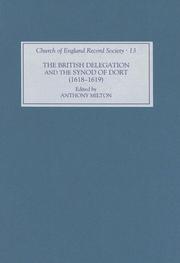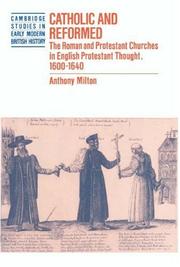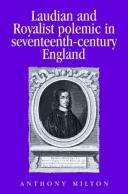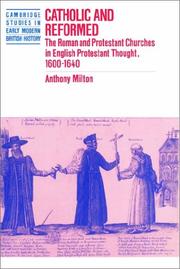| Listing 1 - 10 of 14 | << page >> |
Sort by
|

ISBN: 1843831570 9781843831570 Year: 2005 Volume: 13 Publisher: Woodbridge : Boydell press,
Abstract | Keywords | Export | Availability | Bookmark
 Loading...
Loading...Choose an application
- Reference Manager
- EndNote
- RefWorks (Direct export to RefWorks)
Synod of Dort (1618-1619) --- Church of England --- History --- 17th century

ISBN: 0521401410 0521893291 0511560737 Year: 1995 Publisher: Cambridge New York Cambridge University Press
Abstract | Keywords | Export | Availability | Bookmark
 Loading...
Loading...Choose an application
- Reference Manager
- EndNote
- RefWorks (Direct export to RefWorks)
Religious controversy was central to political conflict in the years before the English Civil War. Where earlier historians have focused more narrowly on the doctrine of predestination, Dr Milton analyses the broader attitudes which underlay notions of religious orthodoxy. Through the first comprehensive analysis of how contemporaries viewed the Roman and foreign Reformed churches in the early Stuart period, Milton demonstrates the way in which an author's choice of a particular style of religious discourse could be used either to mediate or to provoke religious conflict. This study challenges many current historical orthodoxies. It identifies the theological novelty of Laudianism, but also exposes areas of ideological tension within the Jacobean Church. Its wide-ranging conclusions will be of vital concern to students of early Stuart religion and the origins of the English Civil War.
Christian church history --- anno 1600-1699 --- Great Britain --- England --- Church history --- 17th century --- Church of England --- Relations --- Catholic Church --- History --- Anglican Communion --- Reformed Church --- Arts and Humanities --- Catholic Church. --- Reformed Church. --- Anglican Church --- Anglikanskai︠a︡ t︠s︡erkovʹ --- Ecclesia Anglicana --- Kirche von England --- United Church of England and Ireland

ISBN: 1781700818 1847791506 9781847791504 9781781700815 9780719064456 0719064457 9780719064449 0719064449 1847795684 Year: 2007 Publisher: Manchester Manchester University Press
Abstract | Keywords | Export | Availability | Bookmark
 Loading...
Loading...Choose an application
- Reference Manager
- EndNote
- RefWorks (Direct export to RefWorks)
This is the first full-length study of one of the most prolific and controversial polemical authors of the seventeenth century. It provides for the first time a detailed analysis of the ways in which Laudian and royalist polemical literature was created, tracing continuities and changes in a single corpus of writings from 1621 through to 1662. In the process, the author presents important new perspectives on the origins and development of Laudianism and 'Anglicanism' and on the tensions within royalist thought.Milton's book is neither a conventional biography nor simply a study of printed work
Religion and literature --- Reformation --- Royalists --- Polemics in literature. --- Reformation in literature. --- Religious disputations --- History --- Heylyn, Peter, --- Influence. --- Colloquies, Religious --- Disputations, Religious --- Disputations, Theological --- Religious colloquies --- Religious debates --- Theological disputations --- Theology --- Debates and debating --- Monarchists --- Monarchy --- Protestant Reformation --- Church history --- Counter-Reformation --- Protestantism --- Disputations --- Heylin, Peter, --- Hall, Robert, --- Learned and impartial hand, --- Churchman, Theophilus, --- Meylyn, --- Officer in his Majesties army, --- Heylin, --- Treleinie, --- Heylyn, Pet., --- Anglicanism. --- English politics. --- Laudianism. --- Peter Heylyn. --- early modern religion. --- polemical author. --- royalism. --- royalist polemical literature. --- royalist thought. --- seventeenth century.
Book
ISBN: 1108164757 1108174108 1108169309 1107196450 9781108174107 9781108169301 9781108164757 Year: 2021 Publisher: Cambridge : Cambridge University Press,
Abstract | Keywords | Export | Availability | Bookmark
 Loading...
Loading...Choose an application
- Reference Manager
- EndNote
- RefWorks (Direct export to RefWorks)
England's Second Reformation reassesses the religious upheavals of mid-seventeenth-century England, situating them within the broader history of the Church of England and its earlier Reformations. Rather than seeing the Civil War years as a destructive aberration, Anthony Milton demonstrates how they were integral to (and indeed the climax of) the Church of England's early history. All religious groups - parliamentarian and royalist alike - envisaged changes to the pre-war church, and all were forced to adapt their religious ideas and practices in response to the tumultuous events. Similarly, all saw themselves and their preferred reforms as standing in continuity with the Church's earlier history. By viewing this as a revolutionary 'second Reformation', which necessarily involved everyone and forced them to reconsider what the established church was and how its past should be understood, Milton presents a compelling case for rethinking England's religious history.
Church of England --- History --- England --- Church history --- Anglican Church --- Anglikanskai︠a︡ t︠s︡erkovʹ --- Ecclesia Anglicana --- Kirche von England --- United Church of England and Ireland
Book
ISBN: 9781108164757 9781107196452 9781316647295 Year: 2021 Publisher: Cambridge Cambridge University Press
Abstract | Keywords | Export | Availability | Bookmark
 Loading...
Loading...Choose an application
- Reference Manager
- EndNote
- RefWorks (Direct export to RefWorks)
England's Second Reformation reassesses the religious upheavals of mid-seventeenth-century England, situating them within the broader history of the Church of England and its earlier Reformations. Rather than seeing the Civil War years as a destructive aberration, Anthony Milton demonstrates how they were integral to (and indeed the climax of) the Church of England's early history. All religious groups – parliamentarian and royalist alike – envisaged changes to the pre-war church, and all were forced to adapt their religious ideas and practices in response to the tumultuous events. Similarly, all saw themselves and their preferred reforms as standing in continuity with the Church's earlier history. By viewing this as a revolutionary 'second Reformation', which necessarily involved everyone and forced them to reconsider what the established church was and how its past should be understood, Milton presents a compelling case for rethinking England's religious history.
Réforme protestante --- Dix-septième siècle --- Church of England --- History --- England --- Church history
Digital
ISBN: 9781108164757 Year: 2021 Publisher: Cambridge Cambridge University Press
Abstract | Keywords | Export | Availability | Bookmark
 Loading...
Loading...Choose an application
- Reference Manager
- EndNote
- RefWorks (Direct export to RefWorks)

ISBN: 9780511560736 9780521401418 9780521893299 Year: 1995 Publisher: Cambridge Cambridge University Press
Abstract | Keywords | Export | Availability | Bookmark
 Loading...
Loading...Choose an application
- Reference Manager
- EndNote
- RefWorks (Direct export to RefWorks)
Book
ISBN: 1526128810 9781526128812 9781526128829 9781526128805 Year: 2020 Publisher: Manchester, UK : Manchester University Press,
Abstract | Keywords | Export | Availability | Bookmark
 Loading...
Loading...Choose an application
- Reference Manager
- EndNote
- RefWorks (Direct export to RefWorks)
"This volume addresses a perennial question in the history of English religion: to what extent did the late-medieval dissenters known as lollards influence the Protestant Reformation? To answer this question, it examines the afterlife of the lollards as shaped by sixteenth-century evangelicals, especially John Foxe, and their seventeenth-century successors. Foxe's Acts and Monuments (1563) is second only to the Bible as the most influential book in early modern England, a juggernaut in Tudor historical writing that solidified the emergent national church. His reorientation of the lollards from heretics and traitors to martyrs and model subjects portrayed these medieval dissenters as Protestants' ideological forebears. This volume offers a strong corrective to the traditional interpretation that Foxe heavily edited radical Lollard views to bring them in line with a mainstream monarchical church. Instead, it shows that a wealth of non-mainstream material is present in Foxe's text that allowed seventeenth-century religious radicals to appropriate the lollards as historical validation of their own theological and political positions, including the act of separation.Lollards in the English Reformation traces the ensuing struggle for the Lollard legacy between conformists and nonconformists, arguing that the same lollards that Foxe used to bolster the fledgling English church in the sixteenth century would play a role in its fragmentation in the seventeenth. This fresh and exciting research promises to shake up our assumptions about Foxe, the levels of radicalism in post-Reformation Protestantism and the significance of historical precedent in post-Reformation polemic." -- Back cover. This book examines the afterlife of the lollard movement, demonstrating how it was shaped and used by evangelicals and seventeenth-century Protestants. It focuses on the work of John Foxe, whose influential Acts and Monuments (1563) reoriented the lollards from heretics and traitors to martyrs and model subjects, portraying them as Protestants' ideological forebears. It is a scholarly mainstay that Foxe edited radical lollard views to bring them in line with a mainstream monarchical church. But this book offers a strong corrective to the argument, revealing that the subversive material present in Foxe's text allowed seventeenth-century religious radicals to appropriate the lollards as historical validation of their own theological and political positions. The book argues that the same lollards who were used to strengthen the English church in the sixteenth century would play a role in its fragmentation in the seventeenth..
Lollards. --- Reformation --- Early movements --- Influence. --- Foxe, John, --- England. --- Angleterre --- England --- Religion --- Histoire religieuse --- Church history --- Early Modern Britain. --- History. --- John Bale. --- John Foxe. --- John Wycliff. --- Radicalism. --- Reformation England. --- Religious Culture. --- William Tyndale. --- Lollards --- Sacraments --- Persecution --- Historiography --- Sermons --- History and criticism --- History of doctrines --- History
Book
ISBN: 9780198822318 9780198822295 9780198822301 9780198822332 9780198822325 0198822324 0198822308 0198822332 0198822294 0198822316 Year: 2019 Publisher: Oxford: Oxford university press,
Abstract | Keywords | Export | Availability | Bookmark
 Loading...
Loading...Choose an application
- Reference Manager
- EndNote
- RefWorks (Direct export to RefWorks)
The Oxford History of Anglicanism is a major new and unprecedented international study of the identity and historical influence of one of the world's largest versions of Christianity. This global study of Anglicanism from the sixteenth century looks at how was Anglican identity constructed and contested at various periods since the sixteenth century; and what was its historical influence during the past six centuries. It explores not just the ecclesiastical and theological aspects of global Anglicanism, but also the political, social, economic, and cultural influences of this form of Christianity that has been historically significant in western culture, and a burgeoning force in non-western societies today. The chapters are written by international experts in their various historical fields which includes the most recent research in their areas, as well as original research. The series forms an invaluable reference for both scholars and interested non-specialists.
Book
ISBN: 1526111950 9781526111951 071908833X 9780719088339 9781526111944 1526111942 0719099773 Year: 2016 Publisher: Oxford Manchester University Press
Abstract | Keywords | Export | Availability | Bookmark
 Loading...
Loading...Choose an application
- Reference Manager
- EndNote
- RefWorks (Direct export to RefWorks)
Drawing particularly on their own writings, provides a comprehensive analysis of the lives of the Cooke sisters, part of the select group of Tudor women allowed access to formal Humanist education and well-connected through their marriages to influential Elizabethan politicians.
Women --- Human females --- Wimmin --- Woman --- Womon --- Womyn --- Females --- Human beings --- Femininity --- Education --- Killigrew, Katherine, --- Russell, Elizabeth Cooke Hoby, --- Rowlett, Margaret Cooke, --- Bacon, Anne Cooke, --- Burghley, Mildred Cooke Cecil, --- Cooke sisters' classical learning. --- Cooke sisters' education. --- Cooke sisters' reading. --- Elizabethan diplomacy. --- Elizabethan politics. --- Tudor political culture. --- female counsel. --- female humanists. --- humanist education. --- learned women. --- mid-sixteenth-century England. --- political activities. --- religion. --- sixteenth-century women. --- stereotype.
| Listing 1 - 10 of 14 | << page >> |
Sort by
|

 Search
Search Feedback
Feedback About UniCat
About UniCat  Help
Help News
News